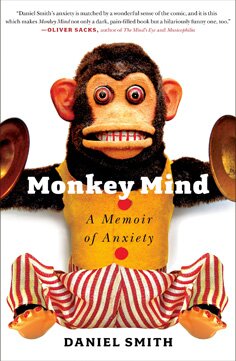The lovely woman
shown here is my mother, Marilyn Smith. Marilyn/Mom is a psychotherapist who specializes in anxiety disorders. Which means that she was first a human being who suffered from anxiety. That, after all, is usually why people become therapists: because first they were patients. You like the smell of paint, you become a painter. You’re scared that the fumes from an open can of paint are going to give you leukemia, you become a shrink.
My mom and I have an interesting relationship. It’s a very Jewish relationship, I think, in that we are capable of loudly denouncing each other and then hugging and laughing as if nothing ever happened. (Every meeting is like the dinner scene in Annie Hall.) I attribute a great deal of my anxiety to my mother, simply on genetic grounds. There are other grounds, too, which I cover in Monkey Mind under the heading “Hurricane Marilyn.” But here the most important thing to note about my mother is her remarkable and invaluable expertise. I have never in my life met someone who knows more about anxiety, both clinically and personally, than she. Her understanding is encyclopedic, and her advice invariably right on the money.
In other words, she’s a great resource. I call her all the time for advice on anxiety: how to treat it, what it means, whether she’ll lend me some Xanax. And it has occurred to me, as I’ve completed Monkey Mind, that it isn’t quite fair to keep my mother to myself. Her knowledge and wisdom should be shared with the world.
Toward that end, I recently initiated an email correspondence with my mom on the subject of anxiety. She’s gamely agreed to make this a regular thing. Once a week I’ll send her some questions, and every Friday I’ll publish them here on this site, for public consumption, under the title “Ask Dan’s Mom.”
I’ve started basic, with some FAQ-type things about anxiety, and as we progress I suspect we’ll get more detailed, and perhaps more personal. If you have your own questions you’d like to ask her, please feel free to email them in to [email protected], and I’ll pass them along — that is, so long as she doesn’t have to worry about liability issues. I don’t want the dear woman being sued.
Let’s start with a simple one. What is anxiety?
Anxiety is fear, worry, or nervous uncertainty about something, and that something is usually an event that has not taken place yet. Everyone has some degree of normal anxiety. In its lesser forms, anxiety is often a good thing. It serves as a motivator. It helps us to study for a test, or to get out of bed in the morning so we’re not late for work or school. This type of brief anxiety is very justified and is like feeling the heat when your hand gets too close to a hot stove. It signals us to do something. But when anxiety is longer lasting and more intense there’s a great risk of developing what we call an anxiety disorder. When this occurs, unpleasant and uncomfortable sensations such as sweating, shaking, palpitations, lightheadedness, stomach distress, etc. may accompany the anxiety and in fact, become the primary problem. For some, anxiety reaches a panic level and becomes very difficult to manage.
What causes everyday, useful anxiety to become “longer lasting and more intense”?
This is a difficult question to answer as there are so many factors that can alter the course of anxiety. Normal anxiety doesn’t just become intense and persistent for no reason, although it may feel like that at times. It usually takes a trigger to cause normal anxiety to go haywire and feel out of control. Most of the time, the triggers are significant life experiences. They can be both positive stressors, such as going off to college, getting married, having a baby, finding a new job; or negative stressors, such as dealing with an illness, a loss of a loved one or losing one’s job.
Are there any other factors behind anxiety besides stressful life events?
There is a lot we can discuss about why some people react to significant stressors with severe anxiety or panic attacks while others may get a bad cold or a fever, or just feel nervous and fatigued. The explanation may lie in genetic make-up and vulnerability to developing an anxiety condition and/or in the way you were brought up by your parents. If a child predisposed to anxiety has an anxious or an ill parent, they may be led to believe that the world is unsafe and frightening. If the parent is overly critical or abusive the child may become increasingly anxious over time. Or if a parent is overbearing and a child does not learn that he/she is competent to care for themselves. Children raised in these environments may not be able to tolerate a significant life event or stressor when it inevitably occurs. The anxiety has already reached a point high enough to spill over when faced with one more frightful trigger, whether it be something mundane or something serious.







I read your op-ed in the Times this morning and have finally seen in print what I have lived with for 78 years. I treated the early years with alcohol (which worked well for the most part, until it stopped working at age 45). I used AA as a substitute and still do. As time has passed it has diminished somewhat although I can still conjure up disasters at the drop of a hat. I have found a meditating machine that I used for high blood pressure that I believe has helped me substantially. I believe many alcoholics drink to alleviate anxiety as I did. I would be interested in your comments.
PS I also became a licensed therapist in the state of Florida